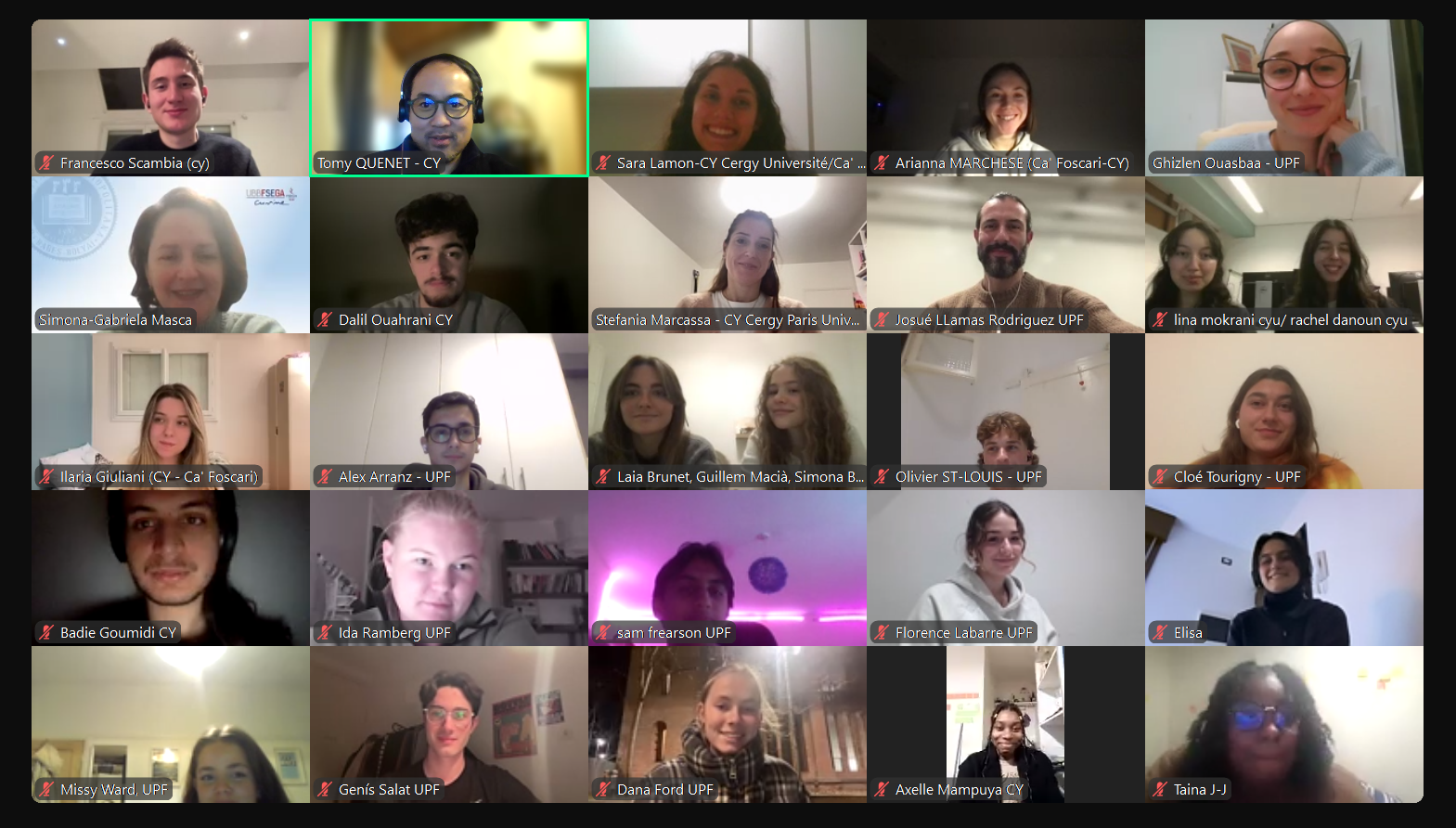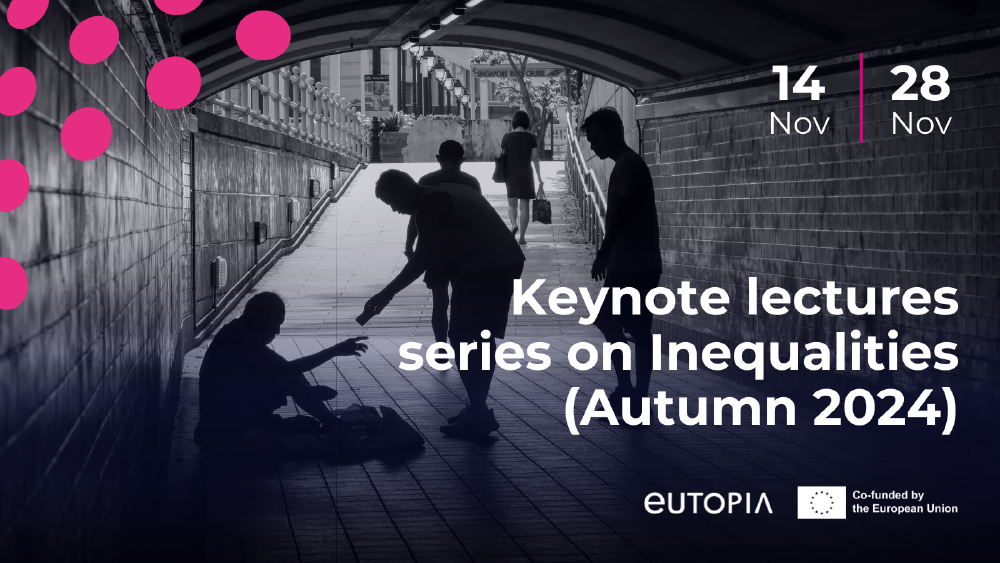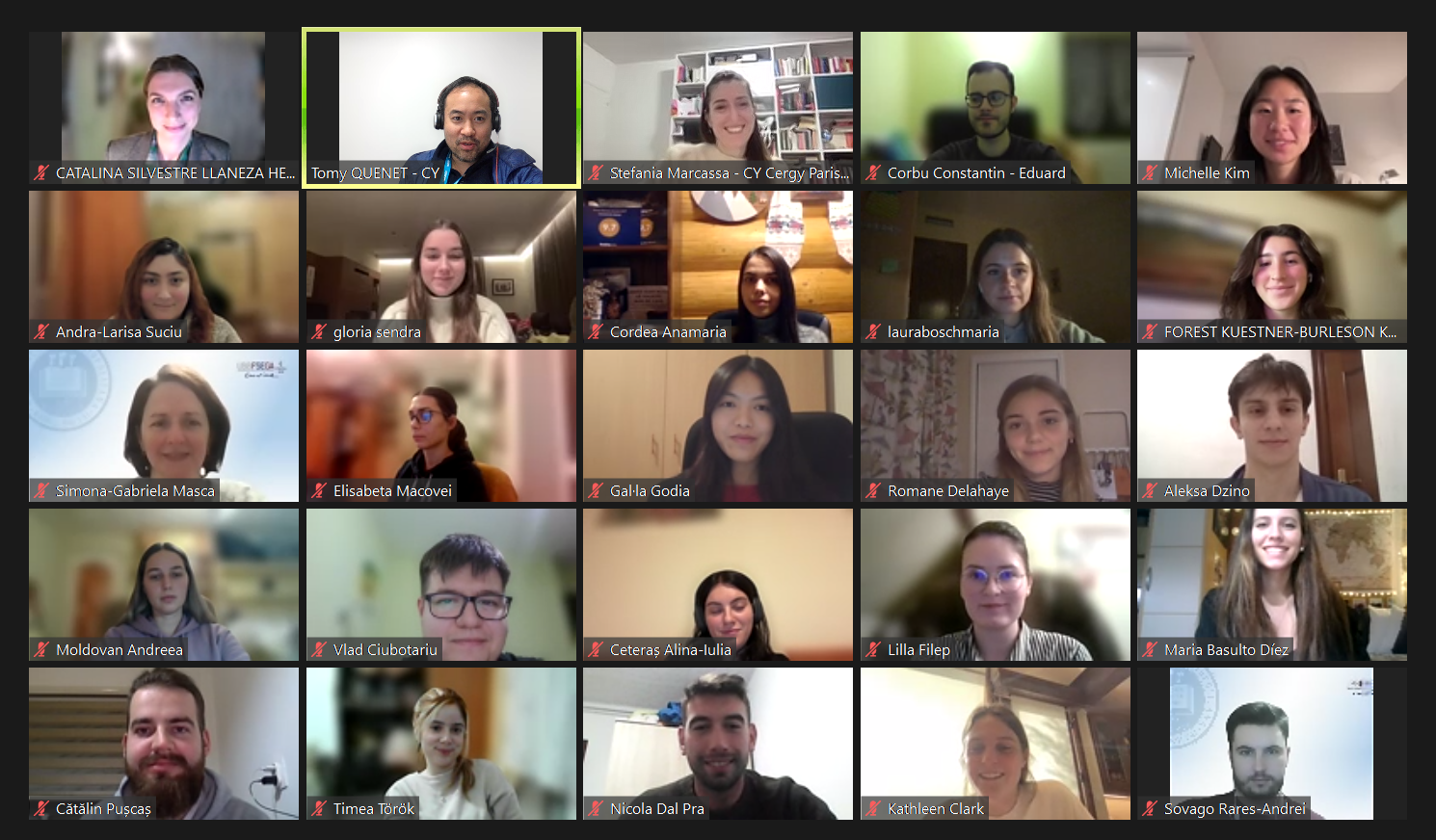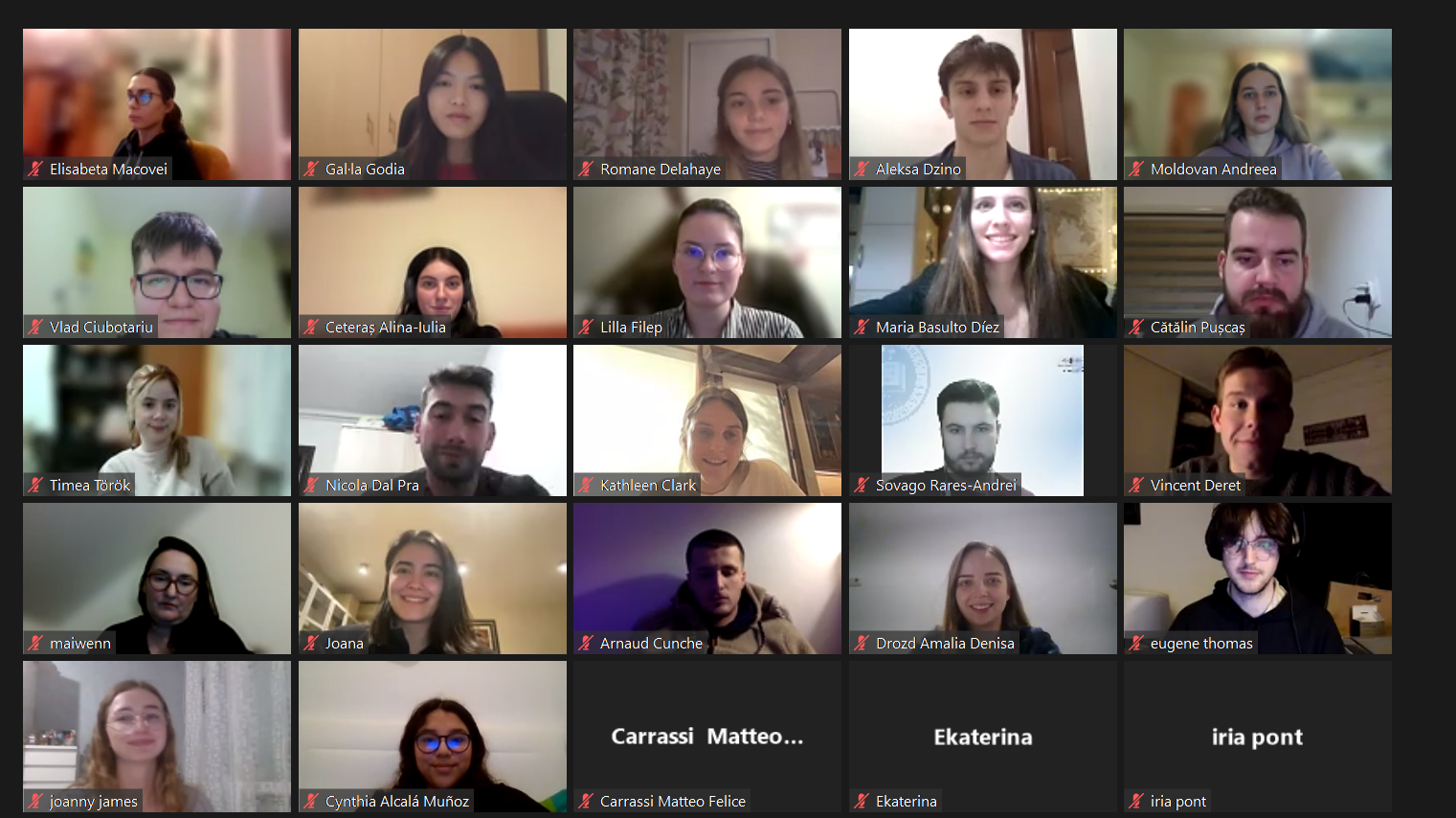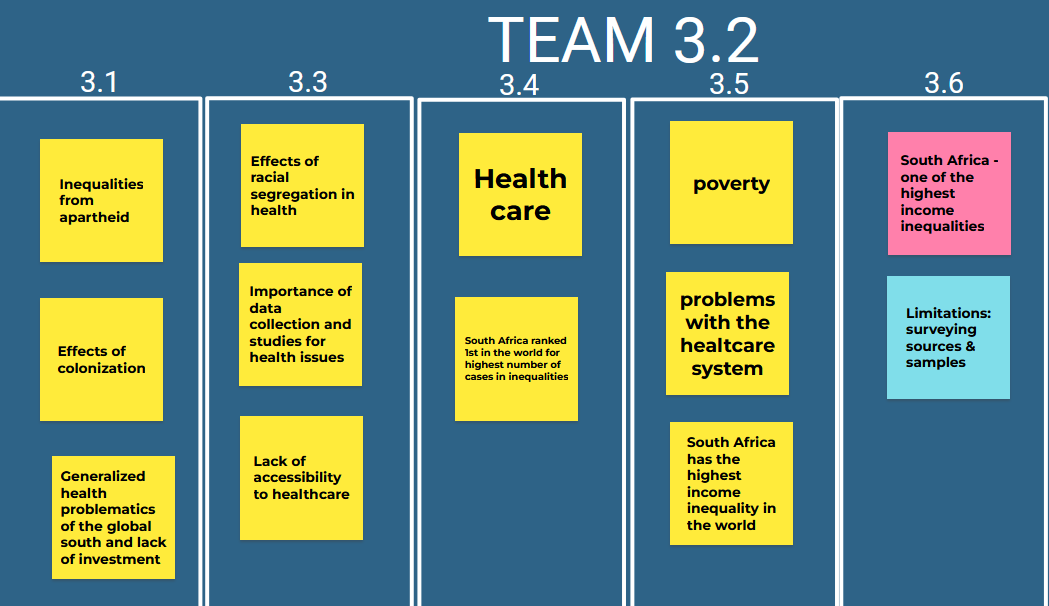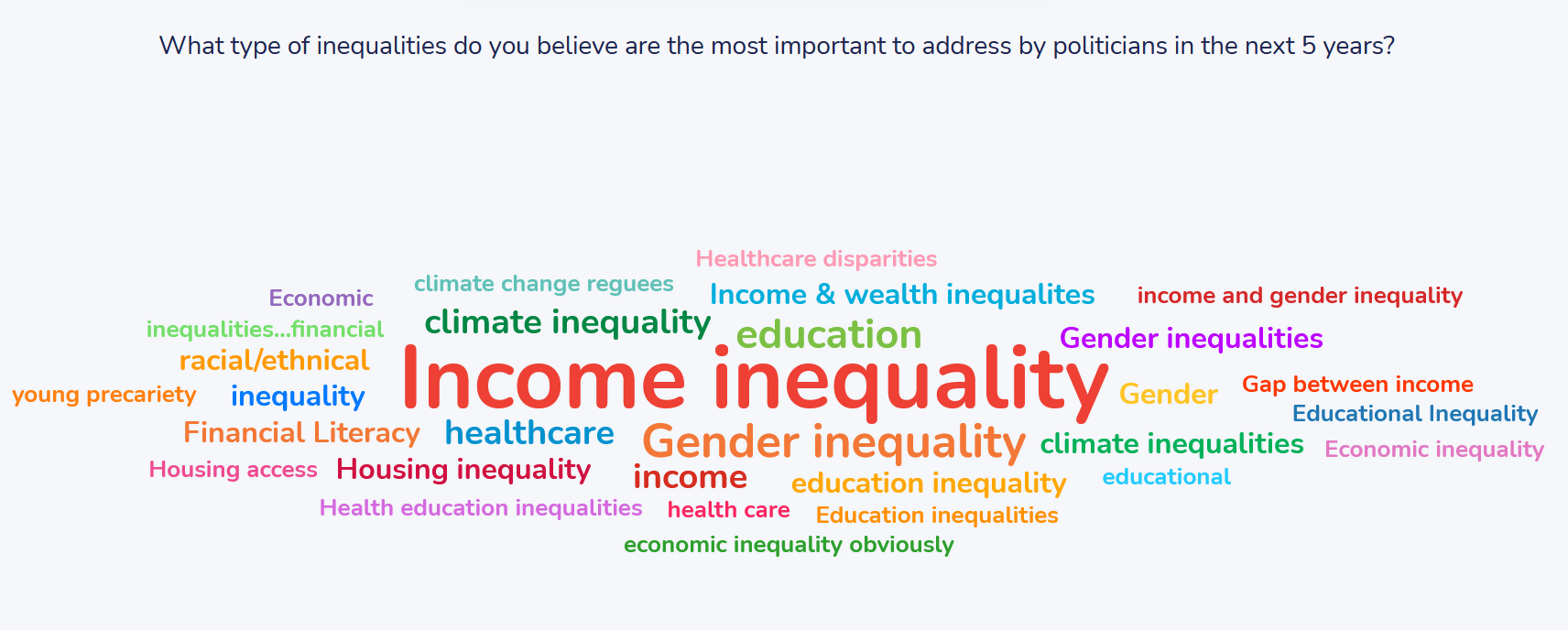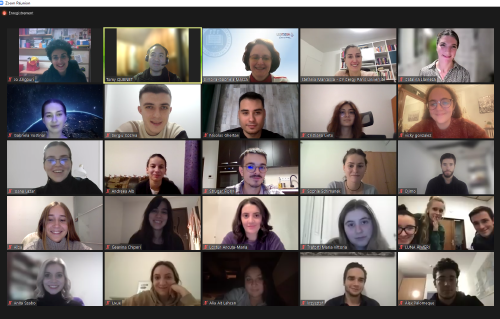You are here :
Inequalities in Contemporary Societies
This EUTOPIA Connected Learning Community is composed of teachers and researchers from different universities in Europe who are active in areas of sociology, economics, and political science. The learning community engages in a transdisciplinary manner, sharing topical knowledge and expertise, whilst co creating cross-campus opportunities for teaching and research, such as:
- Opening up lectures on the topic of economic inequalities. Participating in joint lecture sessions provides to students the opportunity to think about new ways to approach the topic of inequality, to access new resources and to share their experiences.
- Hosting guest lectures with economists that work in international institutions engaged in the fight against inequalities (see past activities below).
- Organising cross-campus empirical projects: The student-led projects encourage students to acquire statistical and analytical techniques to evaluate (critically and empirically), the distribution of access and status within and comparatively across countries. The empirical projects provide hands-on experience in working with data from the World Inequality Database, the OECD, the IPUMS International and the Opportunity Insights. Students learn how data can be used to understand and address important social and economic problems, by introducing basic methods in data science, including regression, causal inference. Students are encouraged to be analytical and creative in their projects. The final joint discussion on project outcomes provides a unique and enriching cross-campus experience (see past activities below).
- How does inequality evolve over the path of development?
- What are the theories that can explain the level of inequalities and its dynamics?
- How do policies affect inequalities?
Learning Community Activities
- Upcoming events
- Past Events
-
Series of online keynote lectures - Fall 2025
Nov 27, 16h30 CET - Science Diplomacy and Inequalities (replay here)
By Eric Piaget (Science Diplomacy coordinator for EUTOPIA)
The lecture begins with a general introduction to the rapidly evolving field of science diplomacy , the nexus of science and foreign affairs . It then turns to the inequalities embedded in the field, from geopolitical imbalances and North–South divides to gender gaps, epistemic hierarchies, and barriers to mobility. Linking these issues to this connected learning community , the session invites reflection on how science diplomacy can both reproduce and redress inequities in contemporary societies .
Dec 4, 16h30 CET - Unpacking educational inequality: life and educational paths (replay here)
By Octavia Borș-Georgescu (Romanian Executive Agency for Higher Education, Research, Development, and Innovation Funding (UEFISCDI))
Abstract coming soon
Dec 11, 16h30 CET - Platforms and the Algorithmic Politics of Labor (replay here)
By Oana Mateescu (Sociology Department of University of Babes-Bolyai in Cluj-Napoca)
Abstract coming soonCross-campus projects 2024
For this 3rd edition of the cross-campus student project, 55 students participated, from UPF and CY, in teams of 1 to 3 members. Each team was asked to do some research on a topic related to inequalities and they had to present their findings with a 5 min video, supported by graphs and charts.
Topics varied from fiscal policies, education, gender inequalities… in diverse European countries (Italy, Germany, Finland…), but also Ghana, Japan, Morocco, Mexico… All videos were compiled in a Padlet board available to all participating students.
Each team was then assigned to watch 2 videos from others projects and prepare questions/comments (public policies, hidden variables…).
We gathered all participating students in a plenary session, which took place online on December 19th 2024. Teams were distributed into 3 breakout rooms, and project videos were played to everyone in the group following by prepared questions/comments and an open discussion on the played topic.
Series of online keynote lectures - Fall 2024
Nov 14 2024, 16h30-18h30 CET - Financial Inclusion (Watch the replay here)
By Stefan Buciuc (BCR Social Finance IFN SA/ERSTE Group)
Financial education is a tool that empowers individuals and businesses to make informed decisions, secure financial stability, and contribute to the overall economy. In Romania, the importance of financial literacy has grown as individuals and businesses face increasingly complex financial products, or struggle with financial management challenges in a rapidly evolving market.
For individuals, this often leads to difficulties in managing savings, understanding loans, and planning while for businesses, especially startups and SMEs, poor financial knowledge can result in mismanagement of cash flow, underutilization of available financial tools, and missed growth opportunities.
In this presentation, we will explore how BCR Social Finance includes financial education in its support for micro and small businesses, communities and education and what is the impact of our approach on the business environment.
Nov 21 2024, 16h30-18h30 CET - Health Inequalities (Watch the replay here)
By Marius-Ionuț UNGUREANU (Associate Professor & Chair - Department of Public Health; Director - Center for Health Workforce Research and Policy, University of Babes-Bolyai)
Health inequalities remain one of the most pressing challenges to global health, disproportionately affecting marginalized populations and contributing to preventable morbidity and mortality worldwide. These disparities are often rooted in the complex interplay of social determinants of health (SDoH)—including socioeconomic status, education, access to healthcare, housing, and social support networks. As the global landscape of health continues to evolve, addressing health inequalities requires a multifaceted approach grounded in public health education, policy reform, and community-based interventions. This presentation explores the role of education in empowering future public health professionals to understand, assess, and mitigate health disparities on a global scale. By integrating SDoH into public health curricula, students are equipped with the critical thinking skills needed to design and implement policies that promote health equity across diverse populations. Key areas of focus will include how public health programs can incorporate lessons on the structural and systemic barriers that perpetuate health inequities, and the importance of fostering cultural competency, social justice, and advocacy in the training of future leaders in the field.
Nov 28 2024, 16h30-18h30 CET - Gender Violence, Social Movements, and Labor Market Dynamics (Watch the replay here)
By Caroline Coly (Visiting Professor at the University of Barcelona and a Researcher at the IEB)
Since the #MeToo social movement, there has been an increased awareness on violence against women. This class will provide an overview of the recent literature around the impact of #Metoo and the consequences of violence against women in the labor market.
Paper presentation : “Migration, Social Change, and the Early Decline in the United States Fertility”
Stefania Marcassa will present a paper in the scientific seminar of the Faculty of Economics and Business Administration, Babes-Bolyai University, on April 25th 2024, 13:00-14:00 CET.
Title: “Migration, Social Change, and the Early Decline in the United States Fertility” (based on joint work with Alessandra Fogli)
Abstract: Our study examines the impact of internal migration on the fertility transition in the 19th-century United States. We find evidence that fertility declined at a faster rate in counties experiencing higher rates of outward migration, particularly toward the western frontier. To estimate the causal effect of migration on fertility decline, we leverage the number of acres granted to American war veterans by Congress between 1847 and 1855. Our research explores the propagation of novel family values that influence intergenerational behaviors concerning savings and fertility. Migration, coupled with limited remittance technology, prompted parents to engage in precautionary savings. This phenomenon fostered the decline of the multigenerational family structure rooted in an agricultural economy.
Cross-campus projects 2023
For this year’s edition of the cross-campus student project, we had 48 students UPF, UBB and CY, in teams of 1 to 3 members. Each team was asked to do some research on a topic related to inequalities and they had to present their findings with a 5 min video, supported by graphs and charts.
Topics varied from fiscal policies, education, gender inequalities… in diverse European countries (Spain, Germany, Finland…), but also India, Japan, Morocco… All videos were compiled in a Padlet board available to all participating students.
Each team was then assigned to watch 2 videos from others projects and prepare questions/comments (public policies, hidden variables…).
We gathered all participating students in a plenary session, which took place online on December 21st 2023. Teams were distributed into 3 breakout rooms, and project videos were played to everyone in the group following by prepared questions/comments and an open discussion on the played topic.
After each video presentation, students were invited to post keywords or takeaways on a collaborative board. Here is an example:
At the end of the session, we polled the students on the following question:
What type of inequalities do you believe are the most important to address by politicians in the next 5 years?
Here are their answers
Student testimonies
“Very fun! Nice to learn of other students and tackle // raise awareness on such important topics that effect millions of people”
“Very cool to learn about such a wide range of issues from similar aged students from other universities. Uncovering intricate economic systems from around the world.”Eugene Thomas, Universitat Pompeu Fabra
« I'm really happy to interact with other students across Europe and debate super interesting topics. It was a pleasure for me! »
Catalin Puscas, Babeș-Bolyai University
“This projet on inequality was very interesting because it pushed us to deepen our knowledge on the subject and this allows us to be informed about current events and the different kinds of inequalities that exist”
James Joanny, CY Cergy Paris Université
Series of online guest lectures - Fall 2023
[CANCELLED] Nov 23 2023, 16h30-18h30 CET - Child poverty analysis and its connection to public policy.
By Ariane Aumaitre (KSNET - Knowledge Sharing Network S.L)
The session will discuss key topics such as the assessment of needs of children and households in poverty, the identification of best practices and the elaboration of concrete, quantifiable, and implementable policy proposals. Specific projects on the area will be used as examples, including a quantification of the societal cost of poverty. A Q&A will follow.
Nov 30 2023, 16h30-18h30 CET - The International Monetary Fund (IMF) Inclusion WorkStream
By Marina Mendes Tavares (International Monetary Fund)
This presentation delves into the evolution of the IMF's workstream on inclusion. It'll examine the parameters set by the institution to determine the relevancy of inclusion from the IMF's perspective. Further, we'll explore the methods the IMF employs to embed inclusion considerations in its surveillance, lending, and research workstream. Lastly, it'll discuss the hurdles the IMF staff face when prioritizing inclusion. A Q&A will follow.
Dec 7 2023, 16h30-18h30 CET - Financial well-being and financial literacy inequalities in Romania
By Miruna POCHEA (Department of Finance, Babeș-Bolyai University of Cluj-Napoca, Romania):
Financial education initiatives rapidly developed across the EU, motivated by various international factors such as financial exclusion, population ageing, increasing debt burden, lack of consumer knowledge or inefficient public good allocation. While these negative factors created an opportunity to multiply financial education programs, they also added an extra-layer of complexity for policy implementation. This study quantifies financial well-being and its determinants, including financial literacy, in Romania. It addresses the primary factors driving low levels of financial inclusion and the interdependence between financial system development and financial education. To understand the determinants of financial well-being in Romania, we conducted a survey using a questionnaire on 1,391 respondents. In general, the results reveal a notable inequality in the distribution of financial well-being among individuals, suggesting the persistence of a poverty trap perpetuated by structural economic deficiencies. In the absence of efficient public policies, the uneducated and low-income individuals do not have access to information being unable to save/ invest and participate in the financial system. A Q&A will follow.
Series of online guest lectures - Spring 2023
1 - April 25, at 5pm CET – Inequalities and welfare state transformations in Central and Eastern Europe after 1989.
Lecturer: Cristina Raț, Sociology Department, UBB
Abstract. The social and economic transformations of Central and Eastern European countries after the 1989 fall of self-declared communist regimes brought along deepening social inequalities and new forms of poverty, precarious labour, and marginalization. Which categories of the population became most vulnerable to the negative effects of enlarging inequalities? Which were the prevalent social policy responses to the problem of poverty? How did welfare states evolve in terms of redistributive capacity and inequality reduction after EU integration? The presentation aims to address these questions with the help of comparative data on four CEE countries with different post-socialist trajectories: Hungary, Poland, Romania, and Slovenia.
Recommended readings:
Adăscăliței, Dragoș (2012). Welfare state development in Central and Eastern Europe: a State of the Art Literature Review. Studies in Transition States and Societies, Vol. 4(2): 59-70.
Aidukaite, Jolanta (2010). Welfare reforms in Central and Eastern Europe: A New Type of Welfare Regime? Economika, Vol. 89(4): 7-24.
Blum, Sonja, J.Kuhlmann, K.Schubert (2020). Handbook of European Welfare Systems. Second edition, revised. London: Routledge. (country chapters on Central and Eastern European countries)
2 - May 23, at 5pm CET – Addressing digital, health, and education inequalities in Latin America through the Erasmus+ SmartNurse project
Lecturer: Jožica Čehovin Zajc & Hajdeja Iglič, University of Ljubljana in Slovenia.
Speakers:
Annukka Huuskonen, Tampere University of Applied Sciences (TAMK), Finland (project coordinator)
Jose Ismael Lopez Perez and Mirna Janete Bulnes, Universidad de El-Salvador (UES), El-Salvador
Dra. Aracely Díaz Oviedo, Universidad Autónoma de San Luis Potosí (UASLP), Mexico
A critical theoretical perspective, continuous research, good policy making, and implementation of policies are four important elements in the global fight against inequality. Academics should contribute to these endeavours in their own way, along with decison-makers and policy-makers. One possibility for academics to engage in this process represents the Erasmus+ program, which under 'Key Action 2: Cooperation among organisations and institutions' supports Capacity building in higher education; projects that enable collaboration and sharing best practices among academics. A good example of how inequalities can be addressed on an international level through the Erasmus+ program is the "SmartNurse - Developing Teachers' and Nursing Students' Competencies in Digital Nursing" project. The three-year project, which involves 7 partners from Finland (TAMK), Slovenia (UL), and Latin American higher education institutions from Mexico (UASLP, UAA) and El Salvador (UES, UGB, IEPROES), started in November 2020 and addresses digital, educational, and health inequalities in Latin America with the aim of modernizing the nursing education curriculum using digital tools and active learning methods. The major inequalities in the domains of digitalization, education, and healts are addressed by improving didactic approaches and the use of digital technologies in the education of nursing students, as well as in health promotion, disease prevention and health care for patients with chronic diseases at the primary health care level in Mexico and El Salvador. The Eutopia joint learning course will present an opportunity to make European students of social inequalities familiar with the project's aims, approaches and methods. The invited guests which include Latin American partners will share with students their first-hand experiences and discuss the challenges of running and implementing such a project.
Cross-campus projects 2022
73 students from CY, UPF and UBB worked in teams of 2-3 members on a topic related to inequalities. Topics varied from education, health, income, fiscal policies... in different countries, such as India, the UK, The US, Israel, Sweden, Venezuela... They synthesized their ideas and results in a short video (around 5 min), supported by graphs and charts. They then all met during a plenary session on Thursday December 15th 2022, where a total of 25 student teams were distributed into 3 groups (breakout rooms). Each team presented their video and one other team was assigned to review according to 3 criteria (interesting outcomes, hidden variables, policies), before opening the floor for discussion. Students could interact and have a critical insight on their peers’ work, but also discover different perspectives of a same topic.A cross-university learning experience was very useful. We could see what and how learn other students, and share our experience with scope to learn from each otherSzabo Anita, UBBThe presentations were very interesting. It was good to learn different aspects of this topic.
Anonymous
Series of online guest lectures - Fall 2022
Dec 8 2022, 16h30-18h30 CET : Andrea Salvatori (OECD) on labor market inequalities: presentation of Employment Outlook and discussion of the unequal impact of the crisis. Q&A will follow. Andrea will present some of the findings from the recent OECD Employment Outlook on the unequal impact of the COVID-19 crisis and the policy challenges arising from the new cost-of-living crisis. https://www.oecd.org/employment-outlook/2022/ https://www.oecd-ilibrary.org/employment/oecd-employment-outlook-2022_1bb305a6-en - Watch replay here.
Dec 1 2022, 16h30-18h30 CET : Francesca Carta (Bank of Italy) on gender inequalities: general presentation of the effects of families policies on firms. Examples of projects carried out at the Bank of Italy. Q&A will follow.
In spite of the large increase in women’s education and employment rates, gender inequalities in the labour market are persistent in all countries in the world. Among European countries, Italy shows one of the largest gaps in labour market participation and employment rates. Filling this gap would contribute to sustained economic growth. The Bank of Italy has run two important projects aimed at explaining the sources of gender inequalities in Italy. In this presentation, I will focus on how fertility decisions and the family dimension affect female labour outcomes. Watch replay here.
Nov 17 2022, 16h30-18h30 CET : Ilf Bencheikh (J-PAL Europe): general presentation of RCTs and of J-PAL work, in non technical terms. Examples from a sector, for example microfinance. Q&A will follow. Watch replay here.
How to get involved?
(Students and educators)Contact Stefania Marcassa (stefania.marcassa@cyu.fr) and Tomy Quenet (tomy.quenet@cyu.fr)
Learning Community Members
- Lead: Stefania Marcassa (CY). Email: stefania.marcassa@cyu.fr
-
Stefania Marcassa (female) is an associate professor of Economics at CY Cergy Paris Université. She is also member of the Human Capital and Economic Opportunity Global Working Group. Prior to her appointment at CY, she had a PostDoc position and taught at the Paris School of Economics (2009-2011), University of Minnesota (2004-2009), and was a Research Analyst at the Federal Reserve Bank of Minneapolis (2006-2009). She earned her Ph.D in Economics at the University of Minnesota in 2009.
She is an applied economist, specializing in the analysis of gender-relevant research, empirical household economics, and economic history. She has published her work in international economics journals, such as the Explorations in Economic History, BE Journal of Macroeconomics, Labour, IZA Journal of Labor Policy. Her work has been reported on Libération, and Toronto Star. She is involved in several research grants: the National French Research Agency (ANR) in 2017-2022 (Family and Inequality) and 2018-2022 (Technology and Job Polarization).
She is the Gender Equality Officier of CY Cergy Paris Université, the scientific coordinator of the H2020 LeTSGEPs project, and a researcher in the E-WinS project. She is also the representative of CY in the International Consortium for Gender Equality on Campus (AUF). Since 2020, she co-organises a Webinar in Gender and Family Economics.
Link to her personal webpage: https://sites.google.com/view/stefaniamarcassa - (former partner: Catalina Llaneza (UPF))
-
Catalina is an applied micro-economist specialized in quantitative methods, currently researching issues related to housing and health. She is a PhD-candidate in Economics at the University of Girona and Adjunct Lecturer at the Faculty of Economics and Business at Pompeu Fabra University, as well as at TecnoCampus (UPF). Additionally, she participates as impact evaluator of a housing project pursued by Urban Innovative Actions and as a researcher at the Chair of Housing and Future (APCE-UPF). At the university she teaches the following courses: data analysis, research methods, economics of the public sector and global inequalities. This last course, related to her LC, is built around the analysis of historical trends and current developments in the field of income distribution, as well as trends and measurement of gender and health inequalities.
- Partner: Hajdeja Iglič (UL). Email: hajdeja.iglic@fdv.uni-lj.si
-
Hajdeja Iglič studied sociology at the University Ljubljana and Columbia University where she earned her Ph.D. Since 2000 she has been employed in the Sociology Department at the Faculty of Social Sciences, University of Ljubljana, where she teaches subjects like Social Inequalities and Politics, Political Sociology, Introduction to Sociology, Social Capital, Social Networks, and Introduction to Critical Thinking and Scientific Writing. She collaborates with researchers in the Research Centre on Strategy and Governance at the University of Ljubljana, where she leads a multi-year research program on Network Based Governance. Her research work includes topics on personal networks, social capital, political attitudes and behaviour, social inequalities and elites. She participated in several international research projects: Eastern European Elites Before and After the Transition; Citizenship, Involvement, Democracy; Economic Change, Quality of Life and Social Change; Efficient and Democratic Multilevel Governance in Europe. She was a Slovenian coordinator for the Erasmus Mundus Joint Master Programme in Comparative Local Development and Joint Doctoral Program on Global Dynamics and Local Development. She has been publishing in international journals such as International Sociology, Scientometrics, American Behavioral Scientist and European Societies. Since 2020 she has been the president of the Slovenian Sociological Association.
- Partner: Simona-Gabriela MASCA (UBB). Email: simona.masca@econ.ubbcluj.ro
-
Simona-Gabriela MASCA is affiliated at Babes-Bolyai University, Cluj-Napoca, Romania. She obtained her PhD in Finance (Economics) in 2007 with a joint supervised thesis by Babes-Bolyai University, Romania and University of Orleans, France. Since 2014, she is Associate Professor at Department of Finance, Faculty of Economics and Business Administration, Finance Department, Cluj-Napoca, Romania. Her research areas include topics such as public finance, income inequality, government policy, government efficiency, economic growth, foreign direct investments, and taxation.
- Partner: Cristina Raț (UBB). Email: cristina.rat@ubbcluj.ro
-
Cristina Raț is lecturer at the Sociology Department of the Babeș-Bolyai University, Cluj, Romania, teaching courses on class inequality and social policies. Since 2015, she has been the chair of the Departament. Her research interest include the relation between social inequalities and welfare states, family policies, poverty and social exclusion, marginalized Roma communities, and precarious work. She earned her PhD at the Babeș-Bolyai University (2008) and holds an MA in Sociology from the Central European University – Warsaw office (2002). Between 2008 and 2016, she was executive editor of Studia Sociologia. She benefited from fellowships at the University of Oxford (2003-2004), IRES-CEPS (2007), and the Aleksanteri Institute Helsinki (2010).
ORCID ID: https://orcid.org/0000-0001-8647-460X - Partner: Jožica Čehovin Zajc (UL). Email: Jozica.Cehovin-Zajc@fdv.uni-lj.si
-
Jožica Čehovin Zajc is an assistant professor and research associate at the Centre for Organisational and Human Resources Research at the Faculty of Social Sciences, University of Ljubljana in Slovenia. She also teaches courses on research methodology at the Faculty of Health Sciences at the same afore-mentioned university. Her educational background includes mass media and communication sciences (BsC) and sociology - human resource management and the employment relationship (PhD). She is passionate about research methodology. Thus, she has taught courses on bivariate and multivariate statistical analysis, trained in methodological summer schools on regression analysis, structural equation modeling, etc. Her research interests cover a wide range of sociology of work and health, focusing on working conditions along with inequalities and precariousness (theoretically and methodologically).
She has worked on several national and international research projects. Projects related to inequalities include two national (EMPATH - Empowering youth to engage in coMbating gender stereotyPes by Addressing Toxic masculinity patterns and beHaviour (CERV), SEGNED - The segmentation of non-standard employment in Slovenia (ARRS)), and two international projects (PERHOUSE - Personal and household services in Central and Eastern European Countries: Improving working conditions and services through industrial relations (SOCPL Project Grants; DG Employment); SmartNurse - Developing Teachers' and Nursing Students' Competencies in Digital Nursing / SmartNu (Erasmus +)). Her bibliography is available here: https://bib.cobiss.net/bibliographies/si/webBiblio/bib301_20230320_190449_33094.html



